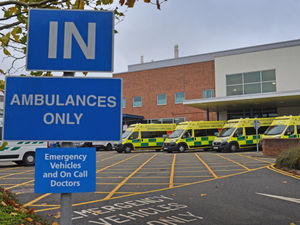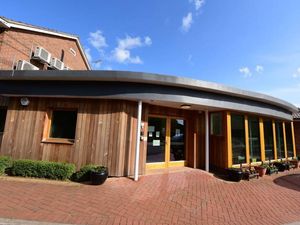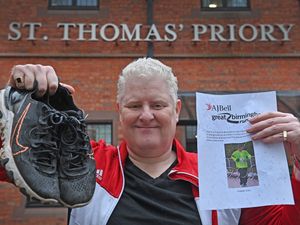West Midlands A&Es miss four-hour waiting time targets as winter sets in
Four of the region's accident and emergency hospital trusts failed to meet waiting time targets that require patients to be seen within four hours of arrival.

The NHS is aiming for 95 per cent as standard, however, the Government has set a two-year plan to stabilise services with a recovery target of 76 per cent of patients being seen on time by March.
A&Es serving Dudley, Walsall, Sandwell and parts of Staffordshire missed both targets last month - the busiest October on record. Meanwhile the best performer in the region, Royal Wolverhampton NHS Trust, which includes New Cross Hospital, surpassed the four-hour recovery target at 77 per cent - but still missed the standard.
Figures show that nearly three-quarters of patients who arrived at Russells Hall Hospital A&E in Dudley were seen within four hours. Of 14,976 visits 10,860 were seen – accounting for 73 per cent of arrivals. But 2,337 waited longer including 173 who waited longer than 12 hours.
More than two-thirds of people who arrived at Walsall Manor Hospital were seen within four hours. Of 13,306 visits 9,287 were seen – accounting for 70 per cent of arrivals. But 1,353 patients waited longer including 170 who waited more than 12 hours.
Two-thirds of people who arrived at A&Es in Sandwell and West Birmingham Hospitals Trust including Sandwell General were seen within four hours. Of 25,491 visits 17,033 were seen accounting for 67 per cent of arrivals. But 2,280 waited longer than four hours including 480 who were delayed by more than 12 hours.
Nearly two-thirds of people who arrived at the University Hospitals of North Midlands were seen within four hours. Of 23,299 visits 15,217 were seen accounting for 65 per cent of arrivals. But 1,983 patients waited longer including 1,057 who waited longer than more than 12 hours.
At The Royal Wolverhampton NHS Trust of 21,123 A&E visits 16,356 were seen within four hours, but 1,070 patients waited longer including 142 who waited longer than 12 hours accounting for 77 per cent of arrivals.
Group chief executive of The Royal Wolverhampton NHS Trust and Walsall Healthcare NHS Trust Professor David Loughton said: “Our ambulance handover waiting times are some of the lowest regionally at Walsall thanks to the hard work of staff.
"In Wolverhampton we are very proud to be achieving the target of seeing 76 per cent of patients within four hours and in October are eighth nationally in this field, again thanks to our brilliant teams. To continue to provide safe urgent and emergency care in the face of increases in demand, is testament to staff’s dedication and commitment.
“We are working hard to make considerable investments at both trusts to improve and provide the best care for our patients.
“One of our biggest projects consists of phase 2 of our new Urgent and Emergency Care Centre development at Walsall, which is imminent – with the opening of a new Ambulatory Emergency Care unit and emergency imaging services within our old Emergency Department.
"We also currently have no Emergency Department nurse or Emergency Department consultant vacancies thanks to our successful recruitment campaigns.”
Danielle Jefferies of health think tank The King’s Fund said: "To get the sector back on track in the longer term and break the cycle of ‘bad’ winters, bold action by government and national leaders will be necessary.
"This includes action to make health and care a more attractive career, bolstering out-of-hospital care such as primary, community and social care services."
NHS England said A&E departments had the busiest October on record as 2.2 million people attended accident and emergency departments.
Professor Sir Stephen Powis, NHS national medical director, said: "Today’s figures are a stark reminder of the ongoing pressures the NHS is facing, particularly in emergency care with significant demand for ambulances and A&E, as we head into what we are expecting to be another challenging winter in the health service."
All the trusts were approached for comment.





